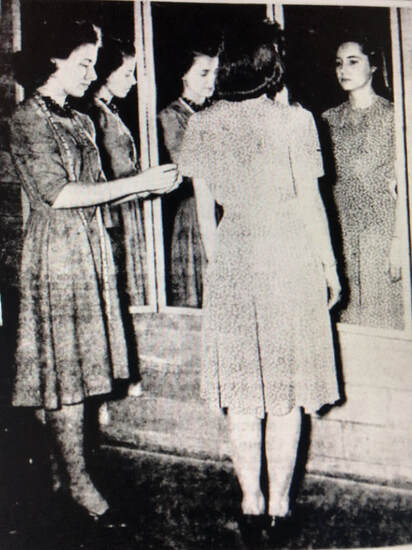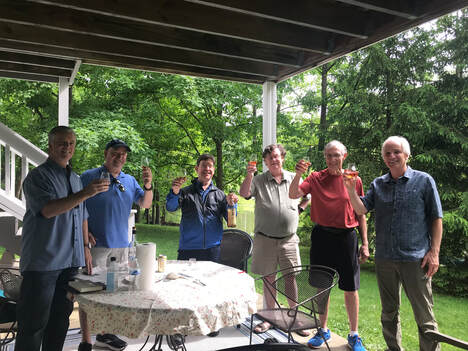 My mother, Mary Marrs Board, on the right, when she was a University of Kentucky student. In the photo, which appeared in the Lexington Leader on November 21, 1940, she is serving as a model for an award-winning “silk print afternoon dress” designed by the student on the left. My mother, Mary Marrs Board, on the right, when she was a University of Kentucky student. In the photo, which appeared in the Lexington Leader on November 21, 1940, she is serving as a model for an award-winning “silk print afternoon dress” designed by the student on the left. I’m not thinking about young girls who will grow up without the protections of Roe. I’m not thinking about the students or the young married women who have lost the choices they had yesterday about their futures and their families. I’m thinking about my mother. My mother, who entered college in 1939 without the assurances I had in 1977. My mother, who so desperately wanted children that she took prescribed poison to protect her pregnancies. My mother, who made sure I understood the choices women had before legal abortion. I can see the two of us sitting in our den in the lower level of our Lawrenceburg home, dim sunlight coming through the dirty glass of the sliding doors that opened to the broad yard. I was sitting on the stone hearth of the fireplace. She was across from me on the sofa. She told me what frantic women had done before. She was matter-of-fact. I was horrified. Incensed. And here we are again, fifty years later. I wonder how my mother would react to today’s news. Would she be as irate as I am about the cruelty of this decision? Would she be more sanguine, having seen more of life, and politics, than I have? Or would she simply be numb? Losing this one “right” may seem small potatoes compared to the looming threat of losing our democracy. How many women and families are really affected? In recent years, fewer than a million women in the U.S. made that choice—fewer than the number of Americans who have died of Covid. And we’ve mostly brushed aside that trauma. I suppose we’ll forget about this, too, in a few short weeks as we make the most of the waning days of summer. But I urge you to be vigilant as the tectonic plates shift ominously beneath us. Exercise the rights you still have. Send a clear message to our self-serving elected representatives. We are the majority. We gave them their power. That is what we can take away.
4 Comments
 A subset of my “family” celebrating a birthday in May 2022. Photo by Joan Brandt. A subset of my “family” celebrating a birthday in May 2022. Photo by Joan Brandt. When my mother died in 1991, I looked around and realized how tiny my “family” had become. My father had died in 1967. I had no grandparents. I was married, and I had one older sister, who soon would move hundreds of miles away. I didn’t like what I saw. So, as I was putting death certificates in envelopes to send to government and insurance and financial agencies, I made a decision. I had a bunch of smart, funny, fascinating cousins. Only a few had I spent much time with; they were all older than I was, some nearly 18 years older. They had grown up at a different time and had different experiences. But I decided right then that I wanted to find a way to pull them in closer. So little by little I reached out to them. As the youngest, it felt a little awkward sending entreaties to my revered, accomplished relatives, but I tried to suppress my insecurity. I asked them to meet me for a meal in Lexington. I invited them to watch polo at the Horse Park. I made a trip out west to see my cousin in Seattle. I spent time in Indianapolis where two of my cousins were caring for their mother, whom I adored. I traveled to North Carolina and Florida to hang out with the more elusive ones, took car trips to Atlanta with the gung-ho ones. I went biking with one cousin, visited the art studio of another, hiked with a few, exchanged political emails with several. When Rick and I moved to “Camp Showalter” here on the lake, I tried to organize occasional family gatherings so we wouldn’t see each other only at funerals. For a while, I even got better at sending Christmas cards. When my friend David Hoefer urged me to compile my father’s early writings in The Last Resort, I had new and more urgent reasons to contact my cousins, especially the older ones. They knew my dad. They had stories. They had spent time with him on Salt River. I always enjoyed our conversations and their company. Then I started this blog. My initial audience was essentially relatives and a few friends. As book projects came and went and the focus of the blog shifted, my connection with my cousins deepened. Anyone who knows me now knows that when I talk about my “family,” I mean my cousins. Which is why the following passage in a recent New Yorker magazine article struck a chord with me. The author, Peter Hessler, is describing his Chinese students at Sichuan University, where he was teaching in 2019. “Among all my students that fall, nearly ninety per cent were only children. I learned that when asking [about their families] I had to clarify what I meant by the word “sibling,” because otherwise students might include cousins in their responses. As families shrank, the term broadened—for many young people, a cousin was a kind of substitute brother or sister.” I couldn’t have said it any better. So to all of you cousins—first, second, third, or fourth—thanks for letting me latch on to you and your families. You have enriched my life in immeasurable ways. I look forward to more gatherings by the lake, more chance meetups on a whim, more walks along the trails. Hail, hail, brothers and sisters! |
Details
Archives
June 2023
Categories
All
|


 RSS Feed
RSS Feed